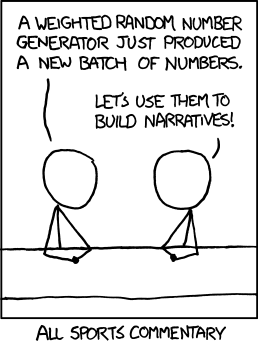Be very careful when reading political messages into Eurovision voting
If you weren’t watching Eurovision on Saturday night, you missed a man in a hamster wheel, twins on a see-saw, some more men on a trampoline, a circular piano, someone rollerblading in the background for no apparent reason, plenty of ridiculous outfits and a winning performance by a drag act singing what sounded like a rejected 90s Bond theme. So just a typical year, really.
I’d like to note at this point that the winning act, Rise like a Phoenix by “bearded lady” Conchita Wurst, fits my theory of how to win. It stood out, not particularly because no one else was singing a similar song (although outright power ballads are definitely less common than they were), but because of the performer, and the surrounding controversy. This brought a lot of attention, and I strongly suspect it would not have won if the same song had been sung by Shirley Bassey. Among 26 songs on the night, it was clearly different, and received its reward.
Now, on to what it means. Conchita said “This is for all those who believe in the future of peace and freedom – you know who you are. You are unity and you are unstoppable.” And her victory has been claimed as a sign of widespread tolerance and liberalism across Europe. Conversely, while Russia were frequently booed, a discussion on the radio this morning suggested that Russia did well, so there was little strong opposition to the country or its policies. Both conclusions go way beyond what the evidence supports.
When you hear that the popular vote in the UK gave first place to Poland’s song, a bosom-heaving act of which Marian Keyes said “For the love of FECK! It’s like a porney fillum!”, what should you conclude from that? Is it that we’re a nation of perverts? That we saw the act as a form of ironic parody? That there’s a large Polish expat community in the UK? Or possibly that we just liked the song?
The truth is that each of the above explains at least some of the votes, although the precise proportions are up for discussion, and the total number of people voting for the song is still a small fraction of the total population. They’re just the ones who cared enough to pick up the phone, and this also offers a clue to the problems with interpreting the results in other ways.
Remember that a song is looking for positive acts of support. It doesn’t matter if 90% of the public hate a song, or even 90% of the voting public, as long as the remaining 10% love it. A winning song never means that Europe as a whole supports whatever message it conveyed, just that a self-selected sample of first preferences, when filtered through an electoral college, put that song on top. And that’s ignoring the national juries.
Total phone votes tend to be around 10m, which is a vanishingly small proportion of the population of Europe. It would be huge for a proper opinion poll, but this isn’t anything of the sort, just a song contest which is occasionally used as a crude proxy for proper political views. It certainly isn’t a referendum on LGBT rights, Crimean sovereignty or any other issue.
So it follows that Europe is not suddenly a continent of tolerance just because an Austrian drag act won an infamously camp and flamboyant song contest. It would be nice to believe that it is, but it would require a high degree of wishful thinking. The same applies when attempting to divine attitudes towards Russia, in either direction.
Russia’s final placing of 7th was this morning advanced as evidence that the country isn’t as unpopular as the crowd’s booing would suggest, but the same argument applies here – even being hated by 90% isn’t necessarily an obstacle to victory. However, with the winning song gathering 290 points and Sweden in 3rd getting 218, Russia’s 89 puts them far closer to France’s Moustache in last place than even a podium position, not such a great showing when put like that.
This becomes even clearer when considered alongside the UK’s support for Poland – there are many Russian expats in ex-Soviet countries, which contributed the majority of Russia’s points. Factors like this rarely have any bearing on the overall winner, but the addition of a few friendly votes does help to nudge average songs towards respectable positions. For Russia, this was a par score at best.
However, and to balance this out, receiving few votes from Western countries doesn’t necessarily mean that everyone hates Russia either. If it’s dangerous to read too much into a positive vote, it’s doubly dangerous to read anything into a negative one. There remains the obvious possibility that viewers may not have liked the song as much as some others. What, you forgot that it’s a song contest? So does everyone, it seems.
It may be possible to discern social and political trends from Eurovision voting, but only in broad terms and not without a lot more work than this – I’m thinking something more like a PhD thesis than a 90-second news report. Sadly, whenever this issue is discussed, I’m put in mind of this xkcd cartoon:
Image courtesy of xkcd.com, used under Creative Commons Attribution-NonCommercial License 2.5

